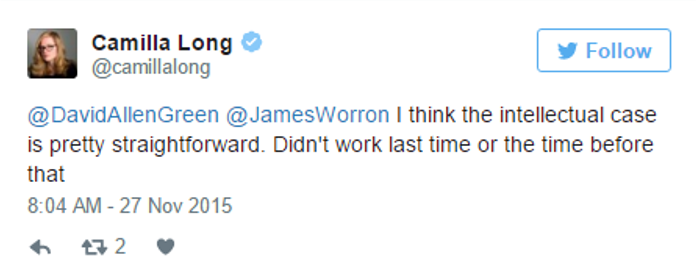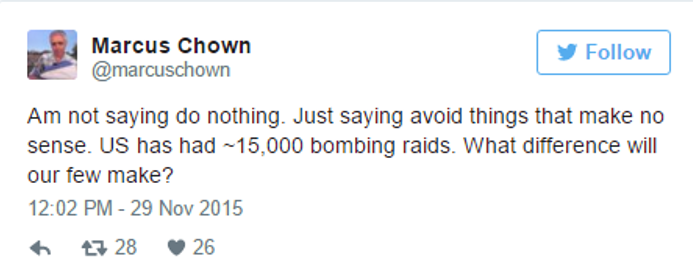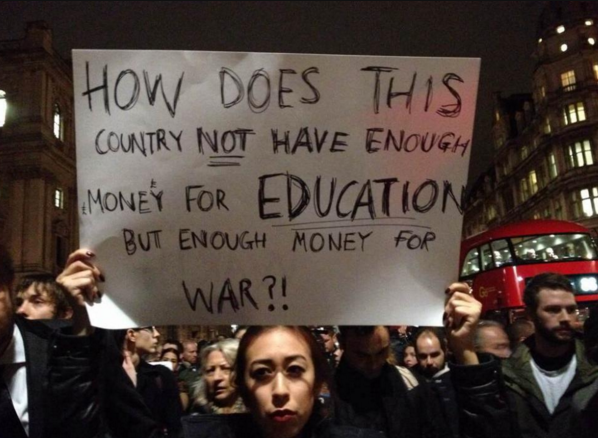Today Parliament votes on the Governments’s plan to expand the scope of British operations against Islamic State. Limitations and problems with the plan have been expressed by many people from various sides. In a previous piece I described the objection I have to the nature of some of this criticism.
The thing is though, I think it’s a pretty lousy plan too and I agree, to various degrees, with much of the criticism. I think in the medium-term it may well marginally increase the risk of terror attacks at home and when that occurs it will also fuel the apologists and give impetus to our domestic Islamists. I think the risks for mission creep are substantial. I think it might help Assad and I think it is possible that more civilians will die because of that. I think it could reach a stage where Putin will be able to make demands of the West in other areas due to the hand he will hold in Syria. I think the risk of increasing Iranian influence and power is great. I think British help will make only a marginal difference. I think the limitations of the ‘moderate opposition’ might be exposed and the case for Western ground troops and special forces will increase exponentially as we progress and we will find it increasingly hard to resist deployment.
I am a supporter of the Government’s plan.
Just about.
If you happen to follow me on Twitter or know me personally you might well think I am a fervent supporter of engagement in Syria and this would be due to how much time I spend arguing against the Stop The War types. This reminds me very much of 2002/3 where once again I found I spent more time objecting to objections than in offering support to what was being proposed.
Anyway, to business. There are so many poor arguments, repeated canards and rank dishonesty being presented that I thought I’d run through a few of them. Those advocating a ‘no’ vote against the government come from across the spectrum and have an array of views. What follows here does not apply to all of them all of the time. You will though hear plenty of these made in the debate on this subject today so I suppose if you wish to play anti-war bingo, this is a good basis for a card.
“You can’t win a war just by bombing.”
Not technically true I’d suggest though in this case it is. However, nobody is telling anybody that this will be ‘won’ just by bombing. Cameron was clear that we will require ground holding units at some point to bring about the defeat of Islamic State in Syria and airstrikes will support them. Already the Kurds are being supported by airstrikes inside Syrian borders, just not by us. Bombing does still have the potential to degrade IS capabilities and kill their commanders however (this is a good thing).
“What do we put in its place?”
This is a good question but is it contingent for a decision? I for one am comfortable with taking the risk of it coming out wrong. I’m not sure ‘better the devil you know’ is particularly strong when that devil is Islamic State. Also, with the number of unknowns before us it is something which is going to remain to a large extent, unknowable. A complete plan for this is not really possible as it stands and I suggest this is not a good enough reason to reject attempts to degrade Islamic State.
(Related) “We need a full and comprehensive plan”
This sounds the “impossible standards” klaxon.
No plan will be full and comprehensive enough for the Stop The War types. However, the likes of Corbyn can always demand it is MORE full and MORE comprehensive.
No plan survives contact with the enemy and with a situation as dynamic and complicated as Syria the idea of a ‘full and comprehensive plan’ is a nonsensical suggestion. However, “plans may mean nothing but planning is everything”, we must plan for what we do next.
A full, detailed, preannounced path to rainbows and sunshine in Syria wouldn’t be worth the printing and distributing. And to make one’s approval contingent on such a thing is not just to create an impossible standard it is to provide an excuse for your ‘no’ decision which is dishonest. We don’t have a full and comprehensive plan. In this time and in this place this is the best we can come up with. If you have a better one, spell it out.
“Iraq is now a worse place than when under Saddam Hussein”
Assuming this is true (plenty of Shia will argue with you and quite a few Sunnis too. Oh, and most Kurds), this is to suggest that life post-Islamic State will be worse than life now because of what happened in Iraq. It isn’t a logical assumption. One could just as easily say that life in Sierra Leone improved after we wiped out most of the West-Side Boys. Neither are good arguments. Each time is different. Though the ‘Islamic State provides stability’ argument is very close to being implied.
(Related) “The last two times we intervened failed so…”

Actually no, the last time we intervened was in assisting the bombing against the Islamic State in Iraq. This was clearly a good thing. It helped the Kurds. It halted the Islamic state advance, or at least prevented them from mounting the next stage, it alleviated some of the suffering of some of the Yazidi and it has assisted greatly in forcing the retreat of Islamic State in some areas. [See this.]
However, assuming they mean Iraq and Libya, the answer is this: It’s not the same. Unless you are suggesting ALL military activity leads to unfavourable results then you need to be clear about what the similarities and differences are between each example. The invasion of Iraq and the support for rebels in Libya have key differences. If you are not willing to argue these and simply make the argument which says ‘intervention is intervention’ then you’re not serious.
“Got to defeat them but you need to get a broad coalition”
Is this not broad enough? How broad exactly is ‘broad’? Impossible standard alert.
“Cameron asked us to bomb Assad now he wants us to ally with him”
This is a canard that has been used by many and keeps coming up. Cameron was asking for a “tough response to the use of chemical weapons”. This was about Western credibility regarding the use of WMD. Strikes on facilities for a limited time were the intention. It sent a message, it maintained the credibility of ‘red lines’. It was never proposed as a war against Assad. As such it bears no relevance to the policy proposed today. This is a charlatan’s tactic.
Besides that, Cameron insists that his policy is Islamic State first. He is not conceding that Assad should remain in the long-term. So if you hear this argument made you’re listening to a bluffer.
“What difference will our few make?”

This is my least favourite of all. It is suggesting that we should merely allow our allies to do the work for us and assume both the risks and the costs alone. I don’t consider this morally serious. In fact I think it is dishonourable and shameful. Cameron said that the UK “cannot sub-contract its security to other nations.” I say this is correct. Even if our own bombs don’t turn any tide it is no reason to leave it all to others.
“We need a full solution with ground troops.”
Bizarrely, Ken Livingstone seems to be suggesting we need a full spectrum assault with long-term ambitions and will. Good on him. Though I suspect this is a bluff because he knows it will not happen and it shields him from accusations of inaction. But if you are one that seeks a more comprehensive solution it is no argument against the plan for increased airstrikes. Furthermore, if ‘mission creep’ is a genuine risk then allowing the mission that you wish to creep to creep into Syria is a good start no?
“They’re a symptom not the disease”
This is the best making the enemy of the good once again. Assuming the statement is true why not try to alleviate symptoms?
“All conflicts end with a political settlement”
or
“We need negotiations and a wider political settlement”
This is a Corbyn favourite. The problem with it is you tend to need to have the bloody war first. A clever German once said “war is the extension of politics by other means”. Why is anybody going to negotiate when they think they can win by fighting? And what Islamic State want cannot be negotiated away. This is fantasy.
“We want peace, not war”
Well guess what, we all do. If you have a peaceful method of ridding the world of Islamic State I would be most pleased to hear it. However, the assumption of Corbyn, previously implied elsewhere, is that those who advocate military action do not wish for peace. Sometimes war is necessary to bring peace about. Corbyn’s team are quick to take umbrage at any assertion that he is a ‘terrorist sympathiser’, though painting his opposition as people who would prefer war to peace is somehow acceptable.
“Cameron is involved in a rush to war”
We are already at war. Islamic State declare it on us. We are already bombing in support of Kurds and against Islamic State inside Iraq. France and the U.S. are also doing so inside Syria. This is simply not a war/peace binary. Besides, there hasn’t been much of a rush, this has been going on for ages.
“Bombing will make us a target”
We already are a target. This is for several reasons but not least because we are already bombing them. If you prefer us not to be attacking Islamic State at all, then say so.
According to the intelligence services several plots this year have been foiled already. We are not at peace now and I cannot see that our good fortune in not receiving an attack is because they just haven’t tried hard enough yet.
Furthermore, so bloody what? If people say they will murder civilians and down airliners if we engage with them is that less of a reason to kill them or more of one? Are we just to accept the terrorist’s veto and leave it to our allies to bear all the risk? Spell out that case more clearly please and take ownership of the implications.
“They don’t need Raqqah to launch an attack like Paris”
This is probably true. However, the ability of Islamic State to hold ground means they are better able to recruit, train, plan and organise. This means greater potential for ‘spectaculars’. If denying them their capabilities doesn’t prevent Paris (it might make it harder though), it still helps to limit their capabilities to do other, worse, things.
“We will just make matters worse”
Possibly. Though I note most do not spell out how. But imagine how bad things would be if Islamic State was allowed to continue to grow. They had momentum, the reputation of invincibility, they call themselves the ‘Caliphate’ with all its attraction to jihadists and they spread unspeakable misery wherever they go. Not fighting them will certainly, definitely, definitively, make things worse. We need to discredit the invincible Caliphate and the sooner the better.
“Civilians will die”
True. It’s terrible. Fortunately our armed forces are getting ever better at minimising this and take great pains to do so. However, here’s the rub. Civilians ARE dying already. The abandonment of a utilitarian approach and basing the morality of this on “at least their not killed by us” is morally wrong. Unless you can reasonably attempt to demonstrate that more will die this way than from inaction this is not a good argument.
“The ‘70,000 moderates’ is a made up figure”
It just isn’t. The numbers might change either way, some might not turn out moderate enough, they might be useless, they might end up fighting each other. It is a tricky part of the plan which Cameron admits comes with risks. But the knee-jerk statements that these numbers are nonsense are exactly that. Knee-jerk and themselves, nonsense.
“It’s just what they want us to do”
The actor Stephen Fry tweeted the following:
There tends to be more than one rule in conflict, Sun Tzu has a ton of them. But ok… Firstly, at what level does this rule apply? Surely this applies when actually engaged and not in the decision to fight. It is possible for one side to want to fight and be completely ill-judged about that. Secondly, because somebody asks for martyrdom and entry to a paradise Fry doesn’t believe in, that’s no reason not to oblige with the contingent element in that process. Namely, killing them.
And why limit the categorising of the action to just attacking them? Perhaps the distinction is that they want us to attack and lose but what they want least is for us to attack them and win?
More to the point, how is it that so many are so certain that this is exactly what they want? What specifically is this based upon? I would bet any money I have that when engaged in the fight for Sinjar the Islamic State would have preferred if the Kurdish units they were fighting did NOT have air support from the US, UK and Canada. Is Fry suggesting they would? Does Fry think the attempted attacks on us over this last year is because they want us to extend our bombing over the border? How does he know this?
“They attack us because they want us to bomb them”
This is basically the same as the last point. However, I wish to add this: Beware of those who claim this and then also claim we are attacked BECAUSE we bomb them. If the motion is passed and we change some locations in our bombing mission and then the mainland UK is attacked, I truly hope the likes of Fry will not claim it is because we bombed them. These are surely mutually exclusive positions? They attack us because we attack them OR they attack us to make us attack them. How can it be both?
“It’s none of our business”
It is. They attack us. There is a refugee crises. And we are all humans.
UPDATE:
“You have no money for X but have money for war”
Saw this photo online and think there’s room for one more.

How UKIP is this? “No money for British Grannies but you have money to try and save foreign types?” It’s the logic that says until every hospital has solid gold toilets you can’t spend a penny on the Olympics.
This is suggesting not that the war is bad because of outcome but merely because of expense. That’s a legitimate argument perhaps but in this case it is saying that a marginal (imperceptible) difference in the ability to spend money on education in this country trumps the chance to allow for say, a Yazidi girl to stop being raped or murdered and be able to get any education there. What are the odds, do you think, that this girl in the picture says the same thing about the foreign aid budget and its relationship to education? I say none.
———–
There are many more. Too many. And most of these points above, fully expanded on, are an essay in themselves. However, in the meantime…

Whereas I am an opponent of the government’s plan, just about, for all the same reasons you list and a few extra:
* We can’t have a detailed plan but I would at least like a well defined end goal and some general idea of how to reach it
* Connected with the above, I don’t believe that ISIS can be eliminated in Syria as long as the Assad regime exists. Assad is the reason there is a civil war, and it has gone far past the point of any possible compromise (the regime’s idea of compromise is something like whether to kill rebel families out to the 3rd cousin or stop at the 2nd)
* We can’t get rid of Assad as long as Russia supports him, even though neither can he ever win.
However, I appreciate your “Bingo card”. I think perhaps we should have used air power to disable Assad back in 2011 or 2012, and then we’d have a situation no worse than that in Libya. And if the regime does go, there may be a case for intervention on the side of a non-whackjob coalition (we can’t and oughtn’t to support JN in any situation but we might have to swallow Ahrar ash-Sham, as they are backed by Turkey, Qatar, and the Saudis.). But I think there is very little we can do right now militarily
Speaking of Turkey and the gulf states, if there were some way diplomatically to get them to stop playing ISIS against the Kurds, that would be swell. Or generally stop playing both sides against the middle and take a more productive role. Ah Middle East, don’t ever change!
Also would be nice to convince Russia to stop playing spoiler, but I doubt that is possible.
As an aside, I’ve seen it suggested that we intervene in Libya (!) because that crisis is actually of a manageable scale.
LikeLike
Thank you Jeffrey.
I’ll first say I have no problem with you analysis or you decision. Or at least nothing substantial. Not that you’re hear seeking my approval it’s merely that I should be clear that you wish to vote ‘no’ doesn’t ring any of the bells I have highlighted here or in much else I have written.
Wouldn’t mind talking about it however.
“We can’t have a detailed plan but I would at least like a well defined end goal and some general idea of how to reach it”
May I ask what this means to you? Or at least how the absence of one affects the decisions and how realistic do you think it is to get what you want? I think perhaps it is possible to want what you want and not consider it contingent in your decision to vote ‘yes’. Is the fact that a committal of regular forces by the UK would almost certainly require another vote in Parliament not enough to quell most of the unease this provides in relation to a ‘yes’ vote?
“Connected with the above, I don’t believe that ISIS can be eliminated in Syria as long as the Assad regime exists. Assad is the reason there is a civil war, and it has gone far past the point of any possible compromise (the regime’s idea of compromise is something like whether to kill rebel families out to the 3rd cousin or stop at the 2nd)”
I certainly agree that the war in Syria needs Assad to go, at some point. I can imagine ISIS gone and him still there though. But, regardless, is not the ‘elimination’ a requirement too far? I mean to say, what if the actions proposed merely ended with a serious degrading of their capability and a clear loss of face/reputation? It seems you are suggesting we can’t attack them unless we end them. Or am I being unfair?
“I think perhaps we should have used air power to disable Assad back in 2011 or 2012, and then we’d have a situation no worse than that in Libya.”
Possibly but Christ knows how hard approval for that would have been. At that stage I think most were happy for it to continue as long as it was contained. And Syria is probably a harder political nut to solve than Iraq is.
LikeLike
Very thoughtful. When it comes to ‘it’s just what they want us to do’ and what that means, try this article from The Atlantic in March. Quite long, but worth a read:
http://www.theatlantic.com/magazine/archive/2015/03/what-isis-really-wants/384980/
IS’s provocational behaviour is because they *want* an invasion: they say this repeatedly in their own publications. They want to bring about a prophesied apocalyptic war by provoking everyone else into violent revenge.
This may backfire on them, of course, but it’s difficult to deny that bombing will cause further alienation in the region (if not elsewhere) that will drive up the numbers joining IS forces. Does any of the information in The Atlantic article inform your views on complying with their request for violence?
LikeLike
Thanks for your comment.
I read this at the time and more than once subsequently.
My thoughts are:
1: This might sound far fetched but often it seems like they are playing a double bluff. And calling out the Great Satan probably has more affect on their image than the Great Satan and they probably know this.
2: Wanting the US to get swamped in a big conflict is one thing, this is quite another. I repeat my question I wrote above, if given the choice would IS in Sinjar have rather the planes were there or not there?
3: I’m not so sure it is that difficult to deny the ‘further alienation’ stuff actually, Depends on several things. And without the infrastructure to take advantage of it, it means less.
4: “Does any of the information….” Yes. Where he says denying them land and breaking up the Caliphate is important I think he is right. Where he says bleeding them with airstrikes and deals with ground units is working and is the best tactic, fine, and not launching a full invasion, I think that is sound too. So yes. I largely agree with Wood. He usually makes sense.
LikeLike